*Prerequisite to all other courses in the series.
Note: This is a comprehensive, technical series, which incorporates Federal Motor Vehicle Safety Standards, Federal Motor Carrier Safety Regulations, manufacturer recommendations, ANSI Standards, and applicable state laws and administrative rules. Successful completion of each course, based upon both written and practical test scores, results in Vehicle Autopsy Certification in that area, while successful completion of all courses results in Master Vehicle Autopsy™ Certification. Comprehensive manuals will be supplied to all attendees.
Vehicle Autopsy™ courses qualify for applicable ACTAR credits.
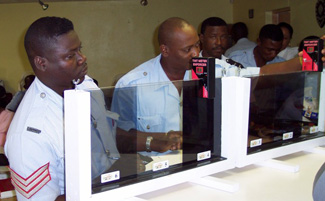 Motor Vehicle Window Tint Meter Instructor Certification Training
Motor Vehicle Window Tint Meter Instructor Certification Training
A 3-day Workshop for Law Enforcement Officers
This comprehensive workshop for police officers covers all aspects of motor vehicle window tinting enforcement, and further provides an educational foundation for “Looking beyond the traffic stop”. In innumerable cases of felony arrests as the result of a traffic stop for illegal window tint, the defense has attacked the lack of training of the officer in utilizing the window tint meter as a law enforcement tool.
Workshop Content:
- Detection and Identification of aftermarket window tint
- Analysis and study of laws governing motor vehicle window tint
- Background and purpose of window tint enforcement
- Calibration and certification requirements of the instrument
- Federal Motor Vehicle Safety Standards and window tint
- Case law and legal issues
- Commercial motor vehicle window tint requirements
- How does the meter work?
- Light properties and the solar spectrum
- Automotive glass design
- Officer safety considerations
- Courtroom survival
- Motor vehicle glass designations
- Operational procedures for the window tint meter
- Expert witness qualification and testimony
- Department S.O.P. recommendations
- Visible light transmittance vs. reflectivity
Upon successful completion, the Motor Vehicle Window Tint Meter Certification Course certifies the police officer in the operation of the tint meter, as well as to teach and certify members of their department in the use of the Laser Labs Window Tint Meters and Reflectometer.
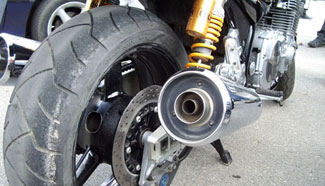 Motorcycle Sound Level Meter Instructor Certification Training
Motorcycle Sound Level Meter Instructor Certification Training
A 2-day Workshop for Law Enforcement Officers
This comprehensive workshop for police officers covers all aspects of motorcyclenoise level enforcement, and further provides an educational foundation for “Looking beyond the traffic stop”. No longer will police officers lack the specific training required in this realm, which has historically resulted in refraining from enforcement of motorcycle sound levels, and potential embarrassment when testifying! As a result of the need to utilize the sound level meter as a law enforcement tool, Comprehensive Motor Vehicle Services & Consulting now offers this technical certification course which is “State specific” and dedicated to the laws in your area.
Workshop Content:
Acoustics and the Analysis of Sound
- Nature of sound – formation, transmission, velocity, attenuation, distortion
- Basic properties of sound in the environment– reflection, diffraction, refraction, absorption
- Measure of sound – intensity, power, pressure
- The dB scale
- Frequency weighting
Sound Measurement Equipment
- Sound level meters – structure, characteristics, calibration
- Auxiliary equipment – calibrator, windscreen, engine speed tachometer, anemometer
- Measurement procedures – use of meters, limitations
Need for Noise Management
- Anatomy of the ear
- Causes of hearing loss
- Effects of high noise exposure – physical and other
- Background and purpose of motorcycle noise abatement
Legal Issues
- Federal Motor Vehicle Safety Standards and the Society of Automotive Engineers Standards
- Analysis and study of State laws governing motor motorcycle noise abatement
- The police officer’s role in the detection and identification of excessive motorcycle sound levels
- Officer safety considerations
- Courtroom survival
Upon successful completion, the Motor Vehicle Noise Level Meter Instructor Course certifies the police officer as a Noise Level Meter Operator, as well as a Noise Level Meter Instructor certified to teach and certify members of their department in the use of Sound Measurement Equipment.
Commercial Motor Vehicle Enforcement Training – The Driver
A 3-day Seminar for Law Enforcement Officers
This comprehensive workshop for police officers covers the enforcement of commercial vehicle regulations, including medical cards, Commercial Driver Licenses, driver logbooks, hours of service, vehicle registrations, fuel permits, and more. This course is region specific and covers both Federal Motor Carrier Safety Regulations and local laws.
Workshop Content:
- Purpose and scope of commercial vehicle enforcement
- MCSAP, FMCSR, CVSA and OOS- What are they?
- Comprehensive analysis and study of local laws with cross-reference to the Federal Motor Carrier Safety Regulations
- What you can enforce, with legal cites – Shutting the door on the “You can’t enforce that!” mentality
- Officer Safety and the commercial vehicle stop
- Federal interpretations
- When is a commercial vehicle NOT a commercial vehicle?
- What documents should the driver have?
- When does a driver need a Commercial Driver License?
- Drug and Alcohol Testing Requirements
- New Hours of Service Regulations – How long can drivers legally operate a commercial vehicle?
- New “Short Haul” Provisions – What about that a landscape company?
- What about that passenger bus?
- Paramount additional investigative steps for accident investigation!
- What is a Driver Qualification File, what does it contain, and how can it be accessed?
- Detecting logbook violations and false logs
- The Pre-Trip and Post Vehicle Inspection – What is required?
- How to properly interview the Commercial Operator
- Is this driver REALLY exempt from having a driver’s log?
- What records the employer is required to keep, for how long, and how to obtain the records
- When is a Medical Card required, and what is it?
- Who is exempt from the regulations?
- Case Law
- The impaired commercial vehicle operator – drugs, alcohol, and fatigue.
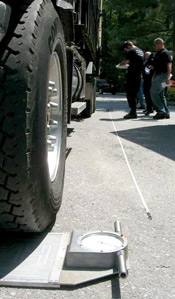 Commercial Motor Vehicle Weight & Dimension Enforcement
Commercial Motor Vehicle Weight & Dimension Enforcement
A 3-day Seminar for Law Enforcement Officers
This comprehensive workshop for police officers includes both classroom and practical training relative to vehicle weight and over-dimension vehicle enforcement. Topics of instruction include the detection of the overweight/over-dimension vehicle, types of scales, application of the federal bridge formula, permits, weights of commodities, local laws, and more. The practical course of instruction focuses on the proper weighing of vehicles.
Workshop Content:
- Purpose and scope of commercial vehicle weight and dimension enforcement
- Analysis and study of state laws governing weight and dimension enforcement
- How can I identify an overweight truck when I see it?
- Weights of materials transported
- Weights of equipment transported
- What is the “weight bridge formula”, and how is it applied?
- Enforcement of posted roads, bridges, and culverts
- Single Axle, tandem axle, tridem, overall gross, and tire weight restrictions and enforcement
- Safety considerations
- What scales can be utilized for truck weight enforcement?
- How do I correctly read portable scale gauges?
- Vehicle height, length, and width restrictions
Commercial Motor Vehicle Equipment Enforcement
A 3-day Seminar for Law Enforcement Officers
This comprehensive workshop for police officers consists of classroom training covering all equipment aspects of commercial motor vehicles, including brake design and inspection, steering and suspension components, tires, safety equipment, inspection of electric trailer brakes, Federal Motor Carrier Safety Regulations, local laws, and much more. The practical segment focuses on the actual detection and enforcement of commercial vehicle equipment violations.
Workshop Content:
- Purpose and scope of Commercial Vehicle Equipment Enforcement
- Analysis and study of State laws governing equipment enforcement, with comprehensive cross reference of Federal Motor Carrier Safety Regulations to applicable State laws
- Application of regulations – Which vehicles do these provisions apply to?
- Safety considerations
- How do I identify a defective component?
- Vehicle braking system overview – hydraulic, mechanical, air, and electric designs
- When are trailers required to have brakes, and how do I know if they are working properly?
- How to properly inspect a tire for violations
- Steering system component inspection and detection of violations
- Flaps, guards, and fender requirements
- Lights, lighting, reflectors, glass, glazing, and MORE!
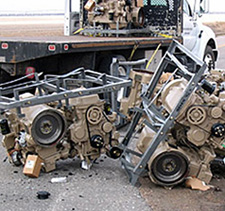 Commercial Motor Vehicle Load Securement Enforcement
Commercial Motor Vehicle Load Securement Enforcement
A 1-day Seminar for Law Enforcement Officers
This 1-day workshop for police officers consists of classroom presentation, work projects, and static displays to provide a comprehensive understanding of load securement requirements applicable to both commercial and noncommercial vehicles. A must for traffic enforcement officers and accident reconstructionists!
Workshop Content:
- Purpose and scope of cargo and load securement
- Analysis and study of local laws governing load securement
- Federal Motor Carrier Safety Regulations regarding load securement
- Current CVSA provisions and Out-of-Service criteria regarding load securement
- Application of provisions to non-commercial vehicles, such as pickup trucks
- Calculating working load limits
- Calculating aggregate working load limits
- How to properly inspect chains, ropes, and straps
- Case law regarding load securement
- How often does the driver have to inspect the load?
- Safety considerations
- Load securement in van trailers
- Proper load securement – Who is responsible?
- Load securement and accident causation
- Proper securement of construction equipment, vehicles, pipe, coils, hay, logs, and MORE!
- Courtroom Survival
- Case Studies
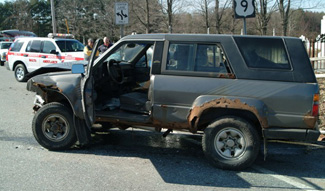 The Detection and Enforcement of the Unsafe Motor Vehicle
The Detection and Enforcement of the Unsafe Motor Vehicle
A 2-day Seminar for Law Enforcement Officers
This comprehensive workshop for police officers consists of classroom instruction regarding the identification and analysis of vehicle components. Day 2 of the seminar includes the practical portion of the class, with the actual detection of unsafe vehicles, applying both state and local laws.
Workshop Content:
- Purpose and scope of unsafe motor vehicle detection
- Analysis and study of local laws governing unsafe motor vehicles
- Safety considerations
- Identification and analysis of defective vehicle components to include:
- Braking systems
- Tires
- Steering components
- Suspension components
- Exhaust systems
- Body and structural integrity concerns
- Glass
- Case Studies
- And MORE!
Motor Vehicle Safety Inspection Training
A 3-day Workshop for Inspection Stations and Governmental Agencies
This comprehensive workshop consists of classroom instruction and hands-on practical experience covering all aspects of motor vehicle safety inspections for Passenger Vehicles & Light Trucks; Trucks, Buses & Trailers; Salvage Vehicles; Motorcycles; and Emissions Programs. This course is region specific and covers both federal and local laws regarding the proper inspection of vehicle components. We cover step by step inspection procedures and rejection criteria. A comprehensive inspection procedure manual is included with this training course.
Commercial Driver Licensing (CDL) Training
A 4-day Workshop for CDL Drivers, Supervisors, and Administrators
This comprehensive workshop for drivers, supervisors, and administrators covers all aspects of commercial motor vehicle driver license training and requirements. The purpose of this workshop is to promote the utmost in safety and professionalism through the proper training and testing of commercial vehicle operators, as well as developing minimum requirements for operators of commercial motor vehicles and proper record keeping strategies for administrative personnel. This training incorporates a PowerPoint Presentation for the classroom segment, a significant “hands on” practical training portion as well as operator skills and driving assessment.
CDL Driver Training Series – Mandatory Special Training Requirements
A 1-day Workshop for the CDL Driver
This seminar meets the FMCSA requirement for entry-level CDL driver training. This course of instruction includes driver qualification requirements, hours of service of drivers, driver health and wellness as well as whistleblower protection requirements as set forth in the Federal Motor Carrier Safety Regulations for entry-level driver training in accordance with 49 CFR 380.503. Training certificates are awarded at the completion of the seminar.
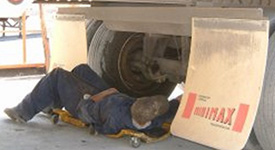 CDL Driver Training Series – The Pre-Trip Inspection
CDL Driver Training Series – The Pre-Trip Inspection
A 1-day Workshop for CDL Drivers, Managers, Safety Officers, Dispatchers, and Mechanics
This course is designed as a complete vehicle inspection course for the new employee, or can be used as a. review for the veteran. The learning objective for this workshop is to demonstrate the practical application of an effective vehicle inspection routine. Using the North America Standard for roadside inspections as a base, the participant will not only have the tools to identify how to inspect the vehicle but will also learn how to properly classify the defects found. This program explains the requirements and importance of vehicle inspections and presents a framework for how to complete proper inspections. This workshop includes review of the requirements and reasoning for vehicle inspection, demonstration of a step-by-step pre-trip inspection, as well as recommendations for “on the road” and post-trip inspections. Each driver is evaluated performing vehicle inspections. Upon successful completion of this course, a certificate is awarded.
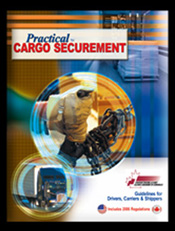 CDL Driver Training Series – Load Securement
CDL Driver Training Series – Load Securement
A 1-day Workshop for CDL Drivers, Managers, Safety Officers, Dispatchers, and Shippers
The workshop covers the North American Cargo Securement Standard. The learning objective is to have the participant understand how to calculate the formulas required ensuring their cargo is properly secured. Unsecured cargo or “loose loads” is an Out of Service item that is becoming one of the most common Carrier Profile violations. Learn what it takes to secure your load safely and avoid violations. You will be able to build your own company/commodity specific program using the materials provided. Certificates will be issued upon successful completion of the workshop.
 CDL Driver Training Series – Commercial Vehicle Driver Computer Simulator Training
CDL Driver Training Series – Commercial Vehicle Driver Computer Simulator Training
A 1-day Workshop for the CDL Driver
This informative and extremely popular workshop consists of initial classroom instruction followed by computer simulator training and assessment. This interactive training is used to improve a driver’s defensive driving, hazard perception, extreme conditions, emergency maneuvers, and crash avoidance skills. Drivers can sharpen their skills in a safe, interactive, virtual environment. Drivers will participate in the pre-programmed operation of a commercial vehicle, which challenges them to drive through a virtual world of interstate highways, narrow two-lane roads, city streets, and dangerous mountain roads, etc. Each driver’s actual trip can then be reviewed from numerous camera angles or through the computer-generated trip report for evaluation. Great for new drivers, seasoned drivers, and remedial training!
 Preventive Maintenance Program Training
Preventive Maintenance Program Training
A 3-day Workshop for CDL Drivers, Supervisors, and Administrators
Preventive maintenance actions are those precautionary steps undertaken to forestall a mechanical breakdown. A well planned and executed preventive maintenance program will result in longer equipment life, lower repair costs, and less lost time or employee inconvenience or hardship due to breakdowns. Following a regular maintenance schedule can extend the useful life of your fleet vehicles and reduce repair expenses. This comprehensive workshop for drivers, mechanics, supervisors, and administrators covers all aspects of the complex business of operating your fleet of vehicles and equipment – from initial setup to properly maintaining a successful preventive maintenance program. Proper maintenance of a vehicle, used in the conduct of business, is a mission critical issue for most companies. To maximize the effectiveness of sales, service and delivery operations, vehicles need to stay on the road with minimum down time. That’s why it’s our mission to provide information that allows for a complete understanding of vehicle maintenance. A properly maintained vehicle saves your company money and provides your drivers peace-of-mind when using company vehicles.



 Motor Vehicle Window Tint Meter Instructor Certification Training
Motor Vehicle Window Tint Meter Instructor Certification Training Motorcycle Sound Level Meter Instructor Certification Training
Motorcycle Sound Level Meter Instructor Certification Training Commercial Motor Vehicle Weight & Dimension Enforcement
Commercial Motor Vehicle Weight & Dimension Enforcement Commercial Motor Vehicle Load Securement Enforcement
Commercial Motor Vehicle Load Securement Enforcement The Detection and Enforcement of the Unsafe Motor Vehicle
The Detection and Enforcement of the Unsafe Motor Vehicle CDL Driver Training Series – The Pre-Trip Inspection
CDL Driver Training Series – The Pre-Trip Inspection CDL Driver Training Series – Load Securement
CDL Driver Training Series – Load Securement CDL Driver Training Series – Commercial Vehicle Driver Computer Simulator Training
CDL Driver Training Series – Commercial Vehicle Driver Computer Simulator Training Preventive Maintenance Program Training
Preventive Maintenance Program Training